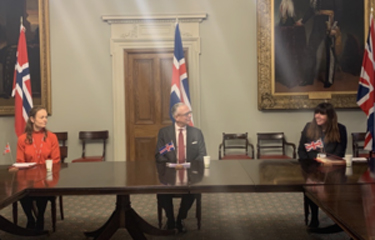With time running out to reach a deal before 31 December, when the United Kingdom stops following European trade rules as a result of its decision to leave the European Union, U.K. Prime Minister Boris Johnson is to fly to Brussels for talks on a post-Brexit deal with the European Commission President Ursula von der Leyen.
According to a joint statement from Johnson and von der Leyen, the pair have taken stock of the ongoing negotiations, and have deemed significant differences on business competition rules, governance issues, and fisheries rights remain the primary sticking points to achieving a deal.
“We asked our chief negotiators and their teams to prepare an overview of the remaining differences to be discussed in a physical meeting in Brussels in the coming days,” the statement said.
The two leaders plan to discuss those primary issues at a dinner this week. Ahead of that meeting, Johnson told members of parliament at Prime Minister's Questions that “a good deal is still there to be done,” but that the E.U. was seeking an "automatic right" to retaliate against the United Kingdom if its labor and environmental standards diverged from those of the bloc, and also that the E.U. is insisting on terms that no U.K. prime minister could accept in the trade talks.
Meanwhile, Canada’s government has confirmed that it intends to table legislation to implement its new continuity trade deal with the United Kingdom this week, ahead of the Brexit deadline.
Canadian and British officials struck the interim deal last month. While the terms of that agreement remain unclear, with regards to future trade arrangements, it is expected to replace much of the Canada-European Union Comprehensive Economic and Trade Agreement (CETA).
And the U.K. has come to an interim agreement with Norway and Iceland to ensure current trade rules in place between those countries remain after the U.K. formally leaves the E.U. The agreement is intended to allow for the continuance of the status quo until the parties can negotiate a comprehensive free trade agreement to come into force in 2021, according to a press release from the U.K. Department of International Trade.
“Today’s agreement locks in tariff-free trade for businesses worth over GBP 20 billion [USD 26.9 billion, EUR 22.2 billion] between our countries, supporting jobs and livelihoods across Britain and beyond,” U.K. International Trade Minister Ranil Jayawardena said. “I look forward to finalizing a comprehensive trade agreement on goods and services with our longstanding partners Norway, Iceland, and Liechtenstein to enter into force in 2021 that delivers on our shared commitment to free and fair trade.”
The agreement ensures 95 percent of the U.K.’s goods trade with Norway and 90 percent of its trade with Iceland remains tariff-free, “providing businesses with certainty that they can continue to operate on the same terms as they do today when the transition period ends,” Jayawardena said.
Iceland’s top export to the U.K. is seafood, with more than 30 percent of the U.K.’s total imports of fish fillets coming from Iceland in 2019. Seafood exports from Iceland and Norway will not face any additional tariffs under the continuity deal. Without the agreement, duties on U.K. imports from Iceland and Norway could have increased by an estimated GBP 65 million (USD 87.3 billion, EUR 72.1 billion) under World Trade Organization trading arrangements.
Photo courtesy of U.K. Department of International Trade







